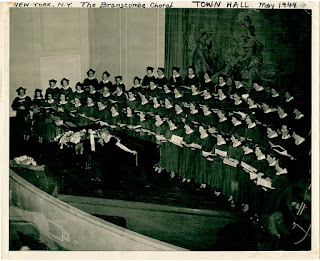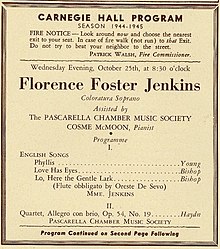Today marks 45 years since Gena Branscombe left this
world. Surviving her were daughters Gena
Tenney Phenix and her husband, Philip, Dr. Vivian Tenney, two grandsons and her
extended family known as the Branscombe Choral.
Gena founded the Branscombe Choral in 1934 and remained its
conductor, composer and arts administrator until 1954. Looking over the twenty years of Branscombe
Choral programs one can easily see numerous women who sang every concert while others
sang only a few concerts.
After the disbanding of the chorus, Gena wrote letters and
notes to members sending them articles about her and her music career. There were always good wishes sent to the
members, comments and questions about their families and more.
Recently my friend Peggie Biscaye Oury, whose mother and two aunts were long time members of the Branscombe Choral, mailed me a note she found in her mother’s files which also included Gena’s New York Times obituary. The note was written by Gena Tenney Phenix. Like mother, like daughter, Gena Tenney Phenix took up the mantle of letter writing and keeping in touch with former Branscombe Choral members.
Many times I have written about the Choral members
cherishing their musical experience with Gena Branscombe. They kept their programs, choral folders,
recordings, articles, newspaper clippings and letters. Thank goodness they did this as many items
have been given to me. I’ve made friends with three members who are now deceased,
their children, grandchildren and nieces and nephews.
On this the anniversary of Gena Branscombe’s death, I thank her for choosing me to carry on her legacy. What a journey and honor it has been.

.jpg)








